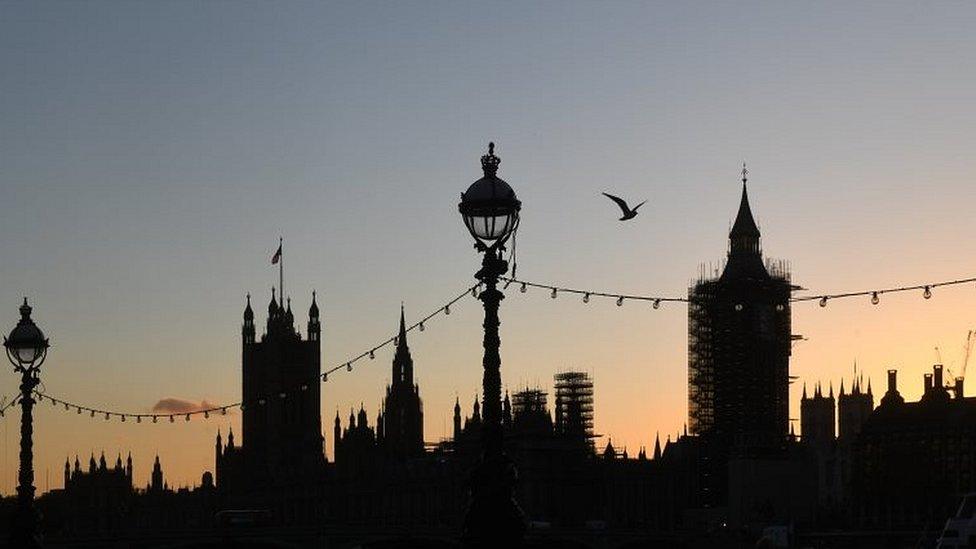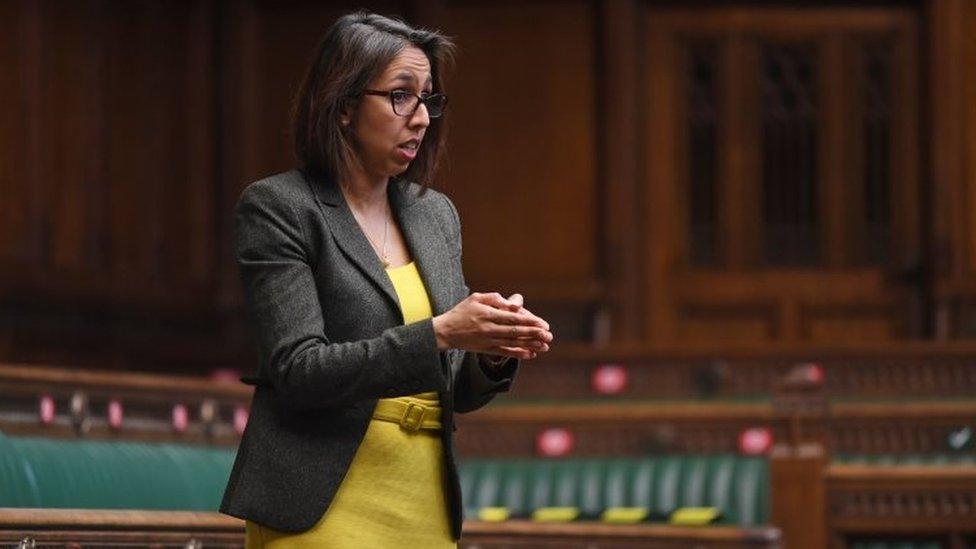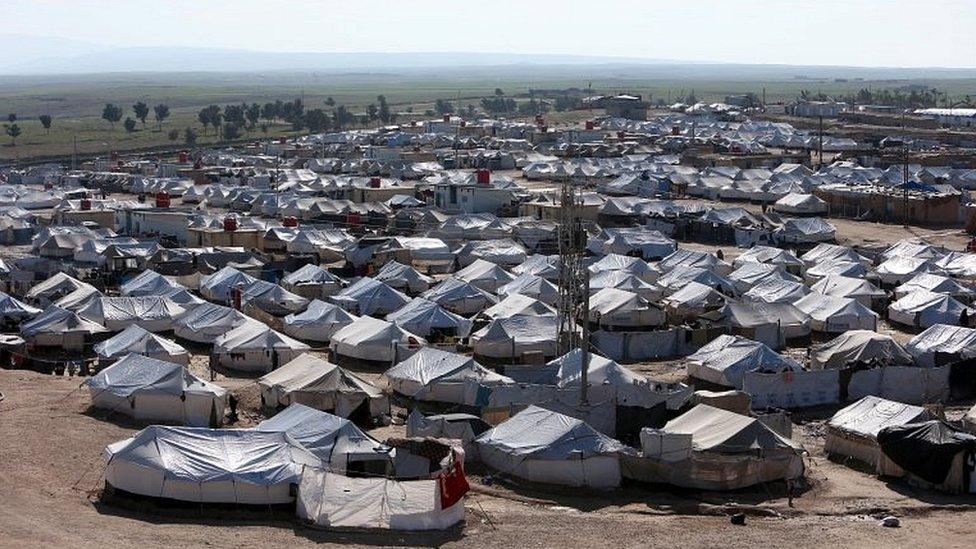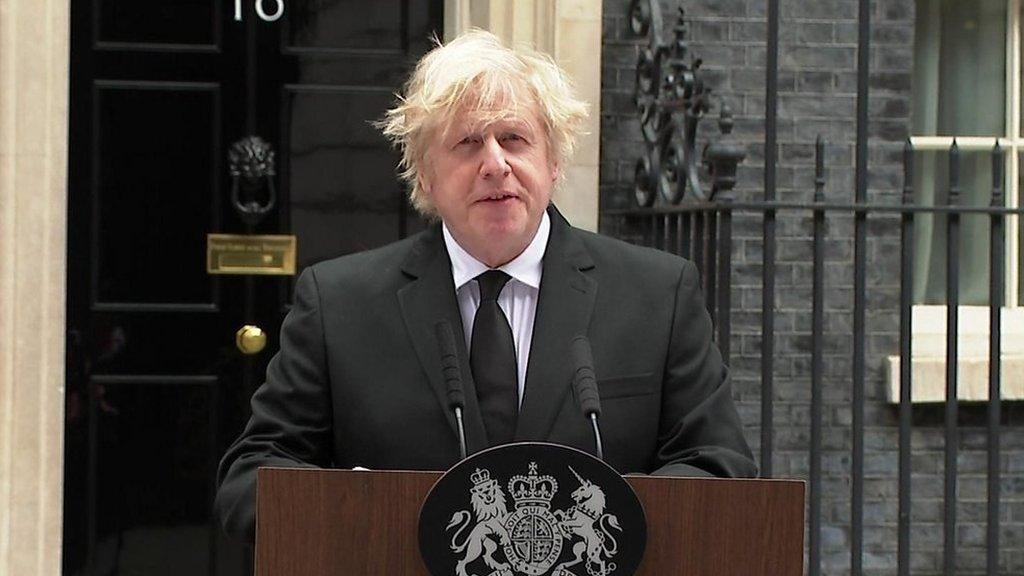The week ahead in Parliament
- Published

There's a distinct feeling of end-of-session winding down this week, with a Lords and Commons putting the finishing touches to outstanding legislation.
And there are some big issues to be resolved, like reaching a compromise on the Labour peer Lady Royall's stalking amendment to the Domestic Abuse Bill, which calls for monitoring of offenders. Labour says it's surprised the home secretary hasn't seized the issue as her own.
Then there's Lord West's amendment to the National Security and Investment Bill, on oversight by the parliamentary Intelligence and Security Committee of inappropriate takeovers of firms important to national infrastructure and cutting-edge research, where the Lords may also press for further concessions.
Similarly former Defence Secretary Lord Robertson has an amendment to the Overseas Operations Bill to halt plans to restrict prosecutions of torture and war crimes by British soldiers serving abroad, and will be pushing for further concessions, as will former Chief of the Defence Staff Lord Dannatt, who wants to place a duty of care on the Ministry of Defence towards personnel under investigation.
And with the clock ticking towards the likely prorogation of Parliament on Thursday, insurgents in the Lords have a little extra leverage over the government.
Between sessions of parliamentary ping-pong, in which bills bounce between the Lords and the Commons until agreement on their final content is reached, the two Houses will also debate assorted orders and regulations - and fill the rest of the time with backbench and committee debates.
Unless there are unresolved differences on legislation, Parliament will prorogue (suspend) on Thursday, and return for the State Opening of a new session on 11 May.
Monday 26 April
The Commons begins (14:30) with Education Questions - which could be followed by some post-weekend urgent questions or government statements. Then comes ping-pong with the Lords on its latest amendments to the Financial Services Bill, the Domestic Abuse Bill and the National Security and Investment Bill.
MPs then turn to the Money Laundering and Terrorist Financing Regulations, which update the list of high-risk countries in respect of which the financial sector needs to apply "enhanced due diligence" to remain in line with international standards on combating money laundering.
Then, there's the Health Protection Regulations, which bring in the new system of managed quarantine for travellers who have been in a "red-list country" in the 10 days prior to arrival in England - as well as mandatory testing for all travellers who have been outside the Common Travel Area in the 10 days prior to arrival in England. Labour has a motion down on this - presumably continuing its campaign for tougher controls.
Finally Conservative Bob Stewart has an adjournment debate on awards for the next of kin of emergency service personnel who are killed in the line of duty.

Simon Case will be quizzed on Greensill Capital's links to government
In Westminster Hall (16:30) MPs debate an e-petition on air ambulance funding, which calls for the government to meet its £12,000-per-day running costs, which at the moment are mostly raised by charities.
Then they turn to an e-petition on the right to protest, which calls for proposed new powers to tackle disruptive peaceful protests to be removed from The Policing, Crime, Sentencing and Courts Bill.
On the Committee Corridor, Public Accounts (14:30) takes evidence on the Covid-19: Culture Recovery Fund from Sarah Healey, permanent secretary at the Department for Digital, Culture, Media and Sport, Darren Henley, chief executive at Arts Council England, and Sir Damon Buffini, chair of the Culture Recovery Fund.
Public Administration and Constitutional Affairs (14:15) looks at the work of the Cabinet Office, with evidence from the Cabinet Secretary and Head of the Civil Service Simon Case, focusing on Greensill Capital and its links to government. This will include questions about the role of the cabinet secretary and the currently unfilled position of independent advisor on ministerial interests.
In the Lords (13:00) ministers field questions on local industrial strategies, the government consultation on the proposal to add folic acid to flour (Labour's Lord Rooker continuing a long-running campaign), reviewing the legislation that implemented the EU Habitats Directive, and the impact of Covid-19 on the levelling-up agenda in relation to the creative industries sector.
Then peers move on to Commons amendments to the Overseas Operations (Service Personnel and Veterans) Bill, where the outstanding issues include allowing investigations of the most serious crimes, and Ministry of Defence duty of care (see above). This is followed by a debate on NHS regulations on pharmaceutical charges and services, where there is a regret motion from Labour's Lord Hunt of Kings Heath.
Tuesday 27 April
The Commons begins (11:30) with Treasury Questions
The day's Ten Minute Rule Bill, from Conservative, Greg Smith, is on prevention of tool theft. He wants online marketplaces to be required include the serial number of power tools and equipment for sale in the searchable part of the advert, to make it easier to trace stolen items when they're offered for sale. These thefts are a serious problem - more than half of UK builders have lost expensive equipment and Mr Smith says the cost is destroying livelihoods.
Then there is more opportunity for consideration of Lords amendments to assorted bills, and MPs will also consider some important regulations. These include those on the Warm Home Discount scheme - a key policy to tackle fuel poverty and the impact of the cost of energy for over 2.2 million low-income and vulnerable households.

Munira Wilson leads a debate on air pollution
In Westminster Hall my eye was caught by the debate on the effectiveness of asylum accommodation and the dispersal scheme in providing support for asylum seekers (09:25) which, unusually, is a joint production from Labour's Neil Coyle and Conservative David Simmonds.
Later Liberal Democrat Munira Wilson leads a debate on air pollution in London (16:50).
Committee action includes Health and Social Care (10:00) takes more evidence on the treatment of autistic people and individuals with learning disabilities from Care Minister Helen Whately, who will be quizzed about the prolonged detention of autistic people and people with learning disabilities in inpatient hospitals as well as the use of physical restraint. This will be the final session of this inquiry - and Claire Murdoch, mental health director at NHS England, will give evidence
In the Lords (12:00) questions range across hazards that arise when cyclists fail to make use of bells (this sounds a little heartfelt and may reflect a recent personal experience), power requirements to enable reliable hydrogen, and battery availability to meet the zero-carbon transport sector target, and the recommendations in the Kalifa Review of UK Fintech.
Then comes another round of consideration of Commons amendments to the Domestic Abuse Bill, where there are still issues in play around stalking, the treatment of migrants and training, and peers will look at the latest Commons amendments to the Fire Safety Bill
Wednesday 28 April
The Commons kicks off (11:30) with half an hour of Scotland questions, followed, at noon, by Prime Minister's Questions.
Former Lib Dem Leader Tim Farron presents a Ten Minute Rule Bill to set up a new regulatory agency to enforce environmental laws.
The main business is to approve another lot of regulations on taxation relief and corporate insolvency, and immigration. There may also, depending on what's been happening in the Lords, be consideration of Lords amendments to the remaining legislation still in play.
Then, MPs turn to a debate the House of Commons internal grievance procedure for staff - the updated mechanism to deal with bullying and harassment. MPs will be asked to agree changes and updates following the latest review.
In Westminster Hall (09:25) Labour's Jack Dromey leads a debate on the proposed closure of GKN Automotive plant in Birmingham
Committee action includes Environmental Audit (14:30) continuing its Fixing Fashion inquiry. And Women and Equalities (14:30) has a session on changing cultures underpinning male violence against women.
In the Lords (12:00) ministers are questioned on enabling Northern Ireland citizens to have the same rights as those of the rest of the UK, the political situation in Zimbabwe, and the occupancy rate in care homes. Then there's another helping of ping-pong, this time on the National Security and Investment Bill.
Peers will also consider the Abortion (Northern Ireland) Regulations 2021 - this is a motion to retrospectively approve changes that came into effect on 31 March, implementing the UK's obligations under the Convention on the Elimination of All Forms of Discrimination against Women to ensure women are provided with access to high-quality abortion and post-abortion care in all public health facilities.
And then it's back to ping-pong, with the Financial Services Bill. where there are unresolved issues on the duty of care and on mortgage prisoners.
Thursday 29 April
The Commons opens (09:30) with 40 minutes of Transport Questions. After that a Business Statement from the Leader of the House is scheduled - but if this is the final sitting before Parliament is prorogued, he might not have much to announce, given that the next sitting week's business will then be the State Opening and the subsequent multi-day debate on the Queen's Speech.
The day's business rather depends on whether amendments to bills are still bouncing between the two Houses - with the government saying that Parliament will only prorogue when Royal Assent has been signified for all remaining legislation. So keep an eye out for whips, bearing the white staffs of court office, performing the ceremonial announcement that assent has been given.

Peers will discuss the humanitarian situation in Syria
At that point (assuming it is reached) MPs will be summoned to the House of Lords to hear a Royal Commission composed of the party leaders in the Lords (in ceremonial robes and cocked or tricorn hats) announcing the prorogation and the summoning of a new Parliament in flowery cod-medieval language.
Committee action includes Welsh Affairs (09:30) concluding its inquiry into renewable energy in Wales, with ministers David TC Davies and Anne-Marie Trevelyan. Public Accounts (10:00) takes evidence from senior civil servants on fraud and error based on this National Audit Office report, external, which found that the government continues to lose large amounts of money through fraud and error overpayments.
In the Lords there's the normal question time, covering such matters as effectiveness of the law in respect of leaseholders and property management companies responsible for the upkeep of communal areas in blocks of flats, the impact of Covid-19 on the humanitarian situation in Syria, government plans for the new Office for Health Promotion, followed by questions to Cabinet Office minister Lord Frost.
If necessary there could be more consideration of Commons amendments on the remaining unresolved legislation.
Related topics
- Published9 April 2021

